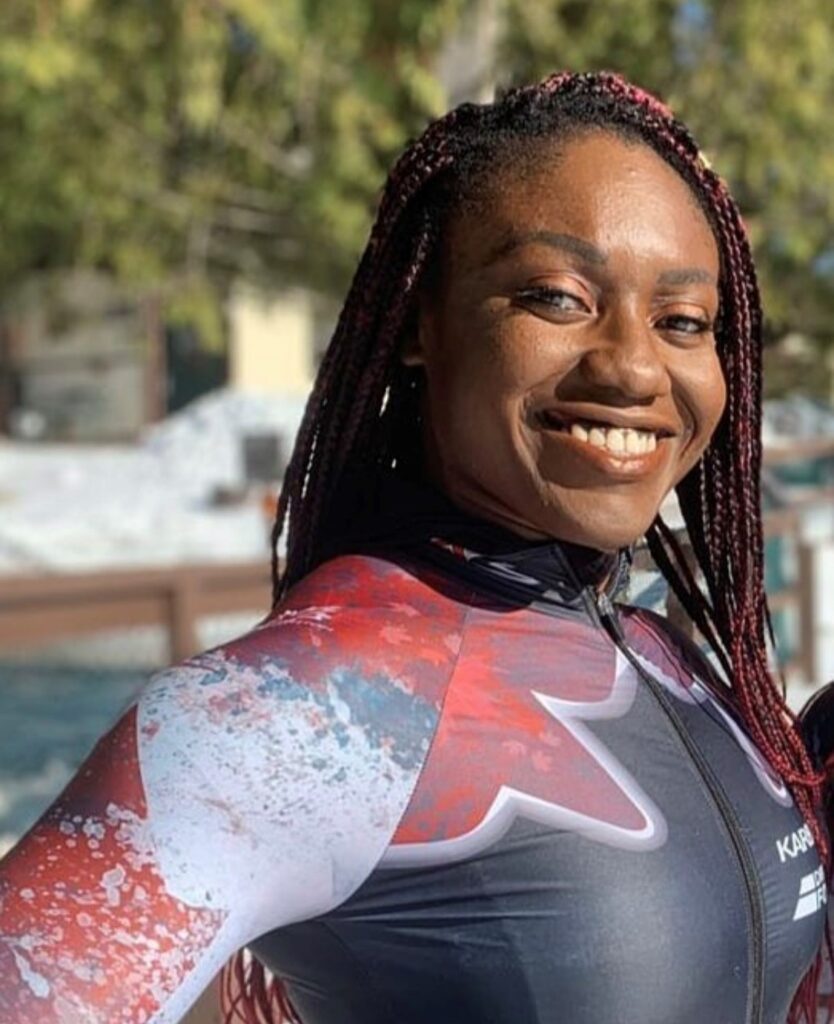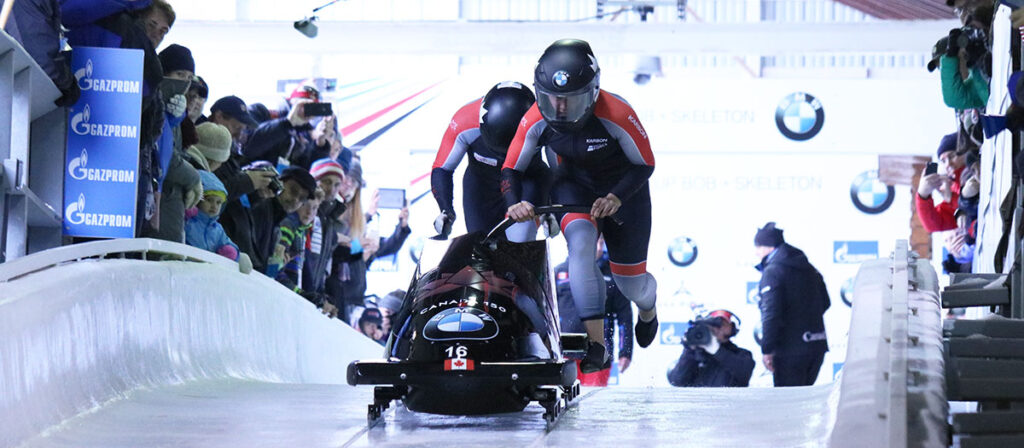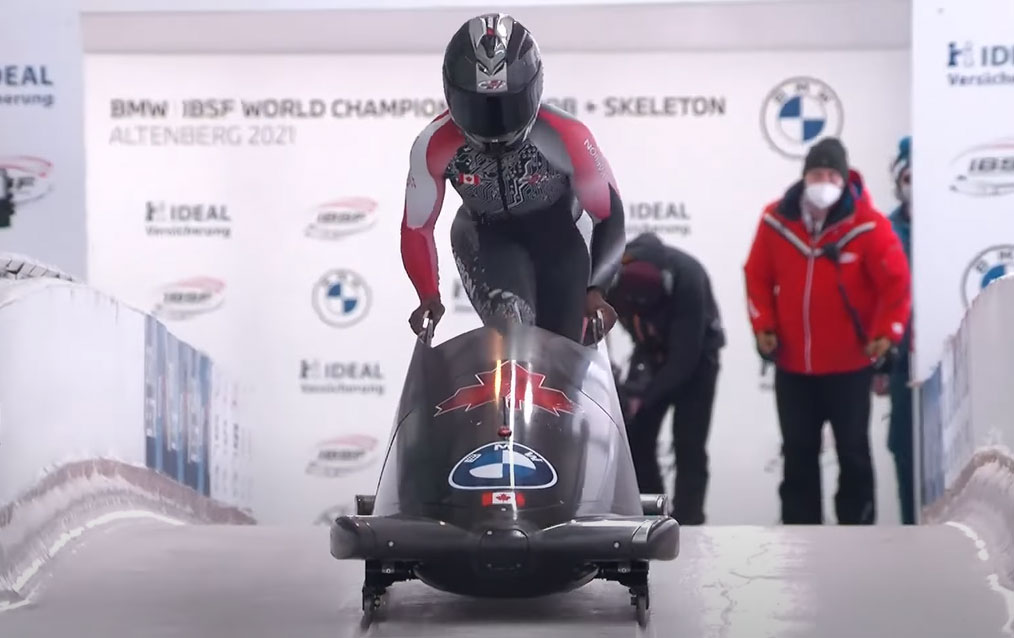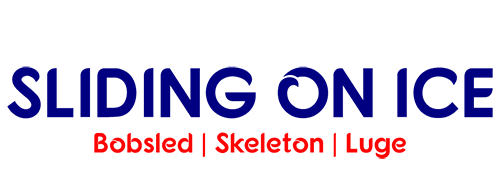(June 14, 20221) – For our third athlete profile of 2021 (and the 25th in the “Getting to Know…” series), we talk with Canadian bobsled brakewoman-turned-pilot Cynthia Appiah! Cynthia is coming off of a stellar 2021 IBSF World Championships where she finished fifth and set the start record in the women’s monobob race and finished as the top Canadian in the two-woman bobsled race in her first World Championships. Before jumping into the driver’s seat Appiah was a top brake woman, pushing teammates Kallie Humphries, Alysia Rissling, and Christine de Bruin all to gold medals between World Cup and North American Cup action.
If there’s a slider you’d like to get to know, drop a note in the contact form above or on Twitter: @thekenchilds

Slider: Cynthia Appiah
Team: Canadian Bobsleigh
Home track: Lake Placid
Hometown: Toronto, Canada
Sponsors: Toyota Canada, Resolve CBD, Sia Abrasives, Foundation Physiotherapy, Momentum SportMed & Wellness, CAN Fund
Like we do every week: What’s your favorite track and why?
I’m going to go with Lake Placid! It was the first ever track I’d slid on as a brakeman, it’s the first track I ever drove as a driver, and I just love how technical it is.
Do you have a part of the track that you enjoy the most?
The labyrinth, 11-12-13, if I nail that section I know that it’s going to be a good run as long as I nail the labyrinth!
What is your favorite town to visit on the schedule?
Igls! I just like being in a place where I don’t have to be stuck at the hotel, and I like being able to get outside and go into town!
What do you do when you get into town?
I shop! I just like going to the mall, but now that I think about it some, Königssee is going to be a strong second place. There’s a spa that I like to go to there and it’s just really nice to go.
Everyone has a story about how they got involved in bobsled, what’s yours?
I was a track and field athlete, I was a shotputter and a hammer thrower and my university got an email saying that the Ontario bobsleigh team was coming to York University to host dry land test camp and that if you wanted to try out it was $20. This is where my memory gets a little hazy: I can’t remember if it was the summer after Vancouver 2010 or a year after Vancouver, but either way Vancouver was in the back of my mind and I could remember bobsleigh and watching it and thinking it was cool and I should test it out.
So I go to the test camp, I did pretty well, and they got back to me and said “Hey, would you be willing to come out and try out for the Ontario team, and I told them I still had two more years of University to go, but I will commit to it! I’ve got this weird behavior where I set my mind on it right away and thought “Okay, I’m going to finish my two years of University but I’m going to start tailoring my workouts toward more speed work and I’m going to try to shed as much weight as I could.” I went to a couple of driving schools in March of 2012 in Lake Placid and got my first real on-ice experience and I thought “This is what I want to do!”
I graduated in 2013, and it took me two years to make our team standard and lose enough weight to make the team, I had to lose about 30 pounds, but once I made the team in 2013 there was no turning back. I ran a few races with Alysia Rissling and we won gold and at that point there was no turning back.
You were very successful as a brakewoman, what brought about the move to the pilot’s seat?
The heartbreak of Pyeongchang and not being named as a racing brakeman. Being named as an alternate after what I had felt like was a successful campaign to allow me to be nominated as a racing brakeman. Then I was told after the last World Cup that I was going to be an alternate and I thought “well this sucks!” I had contemplated quitting after that, but had it not been for Lyndon [Rush], Neville [Wright], and Shelley-Ann Brown convincing me to go to the Lake Placid driving school I never would have contemplated driving.

What was it like in the front after years of riding behind someone?
I had done some driving schools prior to that, but for some reason this driving school was just different. Everyone was there to have fun, everyone was brand new, some of us were there for the first time ever in the sport, some of us were transitioning from the brakes to driver, and some were just there for the hell of it! It felt like a chill, fun environment and I could forget about what had happened in Korea and just be there to try to love the sport again.
When the season end, what do you like to do to relax?
I definitely unwind and kind of jump into work. Up until last year I was working for the Toronto Blue Jays in their box office, I was back in the box office and working on that. I would say for the first month of the MLB regular season I’m just doing my job, watching Jays games, eating ballpark food that I shouldn’t be eating, and things like that. When you eat schnitzel all year long, ballpark food is a nice change. But I otherwise catch up on Jeopardy!, it’s hard to get that on tour. But I’m pretty much a bump on a log!
You kind of have to take that time off, because you’re going nonstop and you either mentally or physically break down. You need that moment to be like “Hey, don’t think about bobsled or whatever, just relax.” And then you can get back to it fresh and ready to attack.
What do you like to watch?
There’s this British show called 8 Out of 10 Cats Does Countdown, I watch a lot of that. My sister’s been trying to get me into The IT Crowd, and it’s just not happening. I usually get British humor but it just doesn’t work for me. I’m also watching Dark Side of the Ring, Last Week Tonight, Black Lady Sketch Show, Insecure, and Ru Paul’s Drag Race!
Last year in World Championships you had strong showing! What was it like scoring a top ten in your first championships?
It was odd. I had absolutely zero expectations, especially in the two-woman event that I would finish as well as I did. Going into that race week we were renting that sled from the Jamaicans and we were kind of able to take it apart and clean it up and put it back together again. My brakeman was someone I hadn’t slid with before so we had no timing whatsoever. I figured it was my first World Championships, I wasn’t really expecting much, I was the third Canadian sled in the field and I’m competing against an entire field of WAY more seasoned veterans. Even against the two girls on my team alone I knew that my goal was just to have fun and enjoy the experience of competing in my first World Champs as a pilot.
After Day 1 when I was as high as I was I thought “Okay, don’t let this affect you. Don’t let it get to your head, just focus on putting down four solid runs and wherever I end up in ranking is where I end up,” on what was a difficult season. At the beginning of the season I had no belief that I would make it to World Champs because I was having the worst time ever on the track at Whistler. With all of the cards stacked against me, to finish as the top Canadian in two-woman was just amazing. I don’t want to make it seem like it was the happiest day of my life because I know that my two teammates did not enjoy their experience. But I had to look at it for what I had overcome and the season I had to be the top finishing Canadian on the women’s side. I had to take that for what it was.
Monobob was a nightmare week! To go from the high of the two-women week to the lows in monobob was a nightmare. I had crashed four out of the six runs out of Corner 9. Everyone was struggling there, but I just couldn’t put two and two together to try to figure out how to get out of that corner without crashing. It had it not been for all of the girls rallying around each other giving each other tips and tricks and the Belgians helping me out with a set of runners I would have had the most rollercoaster ride of a World Championships that anyone had ever had. To finish fifth and to have the start record, I was happy! I knew that my better shot of doing well was in the monobob and that’s obviously reflected in me finishing fifth. But it almost didn’t come to be because of the training week that I had had.
Like the Americans, you had to sit on the sideline for a while while others were racing, what was that like?
It was frustrating. We kind of figured that the first couple of races in Latvia were going to be a write-off because the restrictions that were there were a lot more stringent than Austria or Germany. We had set our sights on doing the Winterberg European Cup race and then stay over the Christmas break to be ready to go in the New Year. Then that got kyboshed because the situation was getting worse in Europe and we’d heard about the Russian team coming down with COVID, the Swiss team getting COVID, and we decided as a team that our best course of action would be to stay as a team at Whistler. But then that was too much for me personally. Any athlete will tell you that the more time you spend on a track the more mistakes you make, and I was a perfect example of that. I think we spent seven weeks in Whistler, not having Calgary open to us to at least break up the monotony of being on the same track over and over again was detrimental to my progression as a developing pilot. As lovely as Whistler is and as much as I gained, I think something was lost by spending so much time there. Seeing the tours go on…looking back I don’t know that we would have changed not going to Europe but I feel like we may have changed not going to Whistler for so long. I think ultimately we did make the right deicison to stay back.
Did you watch many of the races?
I definitely watched them. I’m very much a visual learner and watching those races at least gave us some hope that eventually we’ll get there. It also broke up us being on the same track for seven weeks. Monobob was put on the World Cup circuit I could see and try to figure out what the right lines are and where some of the mistakes were that some of the pilots were having that I could try to avoid. So it was very useful for me watching those World Cup races.
How different are the current model monobobs compared to the ones you’d been driving previously?
It was pretty different. We were told they drive a lot like a two-man which I agree about to some extent. There’s a huge issue with no weight in the back to counteract the skidding. But having driven the older monobobs and hopping into these new ones was frustrating; we were told that they’d pick one or the other between the Latvian or Swiss sleds, but then to find out that wasn’t going to happen and instead we were going to use these new sleds that hadn’t REALLY been raced on by anyone save for a few people, there was a little bit of frustration.

If you weren’t razor sharp prefect you were going to be all over the place. We saw that in St. Moritz, in Königssee, and in Altenberg. Personally I wish the decision to switch to this model of monobobs had been made sooner because we essentially have them for a year and a half to figure them out. We finally figured out how they operate after all of the runs we’ve had, but it was a frustrating first go at them!
Did COVID lockdown affect your training much?
The first thing that changed was access to our training facilities. During the first month and a half of lockdown I was sprinting in a grass field by where I live. Every so often my coach and I would sneak onto a track, but that was just every so often. I was doing a lot of at-home workouts, I was luck enough that my brother was able to get me some dumbbells, a barbell and some 45 pound weights. So I had some weights I was able to work with and we were able to tailor my workouts to that. After the six weeks of sprinting on the grass exemptions were made for athletes in Ontario to use high performance gyms. But that still required me to drive across town. On one end I’d be able to sprint on a sprint track just outside of Toronto, then I would have to drive across the city to the other end in Scarborough to be able to lift at that gym. Nothing was centralized and that was hard. But I knew I was in a better situation than some people who just didn’t have access to anything. I took that in stride and appreciated the work people around me were doing to help me get what I could get.
What has been your favorite time in sliding sports?
Honorable mention go to the two-women championships this year. But I think ultimately for me it has to be the Pyeongchang test event in year three of the last quad, where no one would have thought Rizz and I would be the top Canadians let alone medal on that track. Those three weeks of ITW I hold in high regard. It was so much fun, I was able to hang out with the Austrians one weekend and we went down into Seoul and toured the city. The race week was amazing, I got to learn about my teammates over that three weeks. And after that race day with Rizz we got a big pizza and went to town! But yeah, that time in Pyeongchang is by far my most memorable moment.
On the other end, what’s been the hardest thing you’ve dealt with?
It goes back to being told I was going to be an alternate in 2018. The Canadian Olympic Committee partnered up with our team and there was a big announcement about who was going to be on the team. And I had to put on this façade that I was happy but everyone could tell. I was really wearing my heart on my sleeve and was really one step away from just bursting into tears. The whole Olympic experience in Korea…it’s so funny to see how over the span of one year from the test event to the Olympic year I went to the highest of highs to the lowest of lows. That Olympic experience was terrible. It honestly was.
What was the experience of being an alternate like?
You honestly feel like a shadow. On the one hand you’re designated as an athlete in the event someone goes down you’re going to go in. But I don’t know how it works with other nations but for Canada I was officially support staff. I was restricted from going to going to certain paces and venues, and I wasn’t allowed to stay in the Olympic village. You’re expected to do everything within the village in terms of eating and being on time to be at the track. And at the track you’re doing the majority of the runs to keep the race brakemen rested. But you feel like you don’t get the acknowledgement that you’re putting in all of the work that you’re putting in and it was really somewhat demoralizing. Some people did go out of the way to make me feel better, and other people went out of the way to make sure I knew I was the spare and to make sure I did my job well. Because I’m not the racing brakeman and I’m not going to get anything out of it. And those are the people that I kind of look at and I hope I never turn into that kind of person to make me feel so small. But on the flip side, those people gave me the resolve to come back and be like “I’m going to show you guys up!”
Question from Brendan Doyle (Ireland skeleton): Where is your least favorite warmup area on tour?
I would probably say, I think Winterberg. It’s probably my least favorite place, you’re contending with so many people. They’ve cornered off an area so there’s a section you can warm up but it’s so small. There’s tractor trailers pulling four sleds at a time and you have to make sure they don’t run you over. You need to make sure you’re not slipping on ice.
Where’s your favorite place?
Pyeongchang! I wish other tracks would find a way to either retrofit or renovate their warmup areas to do what they did. There’s an enclosed area with a sprint track. It’s got the rubber track to run on, so you don’t have to 2orry about slipping on a patch of black ice you didn’t see coming!

